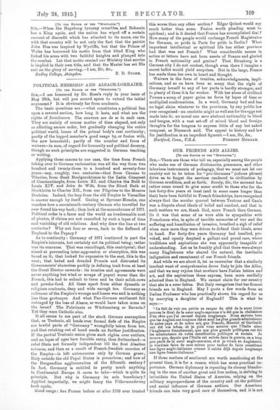POLITICAL HEIRSHIP AND ALSACE-LORRAINE.
[To TIIR EDITOR Or TIER ..lirilorrros.n Sin —I am honoured by Dr. Rose's reply in your issue of May 28th, but will you accord space to extend the initial argument P It is obviously far from academic.
The basic questions are :—what constitutes a political lien upon a severed section, how long it lasts, and what are the rights of ,foreclosure. The answers are do as in each case. They are mainly of course matter of time elapsed, not only as affecting secure order, but gradually changing the entire political world, hence of the primal body's real continuity ; partly of the lopped member's good usage by, or fusion with, the new household; partly of the number and force of waivers—in sum, of regard for humanity and political decency, though no such principles are suggested in German teaching or writing.
Applying these canons to our case, the time from French taking over to German reclamation was all the way from two hundred and twenty-three to a hundred and seventy-four years—say, roughly, two centuries—that from Cannae to Tiberius, from Basil Boulgaroktonos to the Latin Conquest of Constantinople, from Louis XI. and Charles the Bold to Louis XIV. and John de Witt, from the Blood Bath at Stockholm to Charles XII., from our Pilgrims to the Monroe Doctrine. Indeed, the leap from the old Empire to Versailles is answer enough by itself. Gazing at Spruner-Mencke, one wonders how a seventeenth-century German who travelled far ever found his way back ; then look at the monochrome of 1871. Political order is a farce and the world an irredeemable nest of pirates, if claims are not cancelled by such a lapse of time and vanishing of old relations. And why draw the line at two centuries P Why not four or seven, back to the fiefhood of England to the Papacy P
As to continuity : Germany of 1871 continued in part the Empire's interests, but certainly not its political being; rather was its converse. l'hat was centrifugal, this centripetal; that aimed at preventing inter-aggression or absorption, this was based on it; that looked for expansion to the east, this to the west; that hated and dreaded Prussia and distrusted its Governments' shameless perfidy (a defining trait from at least the Great Elector onwards : its treaties and agreements were never anything but wind or scraps of paper) worse than the French, this had to submit to them and be their milch-cows and powder-food. All these apart from either dynastic or religious contrasts, deep and wide enough too. Germany as redresser of the Empire's wrongs and losses was and is nothing less than grotesque. And what Pan-German sentiment felt outraged by the loss of Alsace, or would have taken arms on the issue? The Palatinate or Wiirttemberg or Bavaria ? Yet they were Catholic also.
It all seems to me part of the stock German assumption that, as Teutonic, all lands ever formal fiefs of the Empire are lawful parts of "Germany" wrongfully taken from ber, and that retaking out of hand needs no further justification. If the partial Teutonic union gives such rights over outliers, and no lapse of ages bars forcible entry, then Switzerland—a rebel State not formally independent till the first Alsatian seizures, and then as a result of French-Swedish coercion of the Empire—is left autonomous only by German grace; Italy outside the old Papal States is precarious ; and how of the Burgundian agglomeration of the fifteenth century In fact, Germany is entitled to pretty much anything in Continental Europe it cares to take—which is quite its principle. But why is Germany its sole beneficiary P Applied impartially, we might fancy the Volkerwanderang back again.
Good usage : has France before or after 1789 ever treated
this worse than any other section P Edgar Quinet would say much better than some. Fusion worth pleading must be spiritual; and is it denied that France has accomplished that ? How many of the people would exchange French Magistrates for German, or pride in Paris for pride in Berlin ? What important intellectual or spiritual life has either province had that was not French P What considerable names in action or letters have not been assets of France and gloried in French nationality and genius P That Strasburg is a German city I do not contest, though even there I imagine a secret ballot would yield surprises. But in the large, France has made them her own in heart and thought.
Waivers in the form of treaties, acknowledgments, impli- cations, and so on have been so many that the right of Germany herself to any of her parts is hardly stronger, and to plenty of them it is far weaker. With her alone of civilized Powers a scrap of paper gains no force by lapse of time or multiplied confirmations. In a word, Germany had and has no legal claim whatever to the provinces, by any public law ever recognized—an omelette might as well sue for the eggs not made into it; no moral one save abstract nationality in blood and tongue, with a vast set-off of mixed blood and foreign thoughts for the tongues to express little of any but naked conquest, as Bismarck said. The appeal to history and law for justification is an impudent figment,—I am, Sir, &c.,


































 Previous page
Previous page